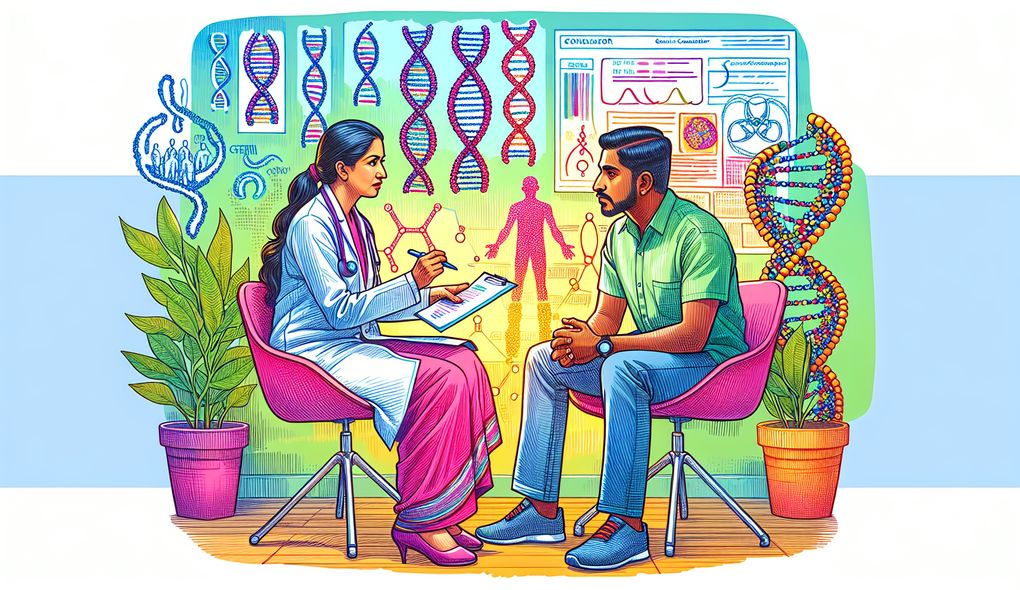How do you assess risk and use genetic testing to interpret results?
SENIOR LEVEL

Sample answer to the question:
When assessing risk and interpreting genetic testing results, I follow a systematic approach. Firstly, I gather as much information as possible about the individual's personal and family medical history. This involves asking specific questions about any genetic conditions or disorders that may be present. Secondly, I review the genetic testing results thoroughly, looking for any variations or mutations that may indicate a specific condition. I rely on my expertise in human genetics and genomics to analyze the results accurately. Finally, I use a combination of evidence-based guidelines, research studies, and my clinical experience to evaluate the risk associated with the genetic findings. This allows me to provide an informed interpretation of the results to the patient and their healthcare providers.
Here is a more solid answer:
As a Genetic Counselor with over 5 years of experience, I have developed a comprehensive approach to assess risk and interpret genetic testing results. Firstly, I conduct a detailed review of the patient's medical history, paying special attention to any genetic conditions or family history of genetic disorders. This helps me identify potential genetic risks that may impact the interpretation of the test results. Secondly, I meticulously analyze the genetic testing data, utilizing my expertise in human genetics and genomics. I carefully examine any variations or mutations present and cross-reference them with existing databases and scientific literature. This allows me to determine the clinical significance of the genetic findings. Additionally, I apply my strong analytical and problem-solving skills to interpret complex genetic data accurately. I consider the patient's specific clinical context, incorporating relevant guidelines and research studies to evaluate the associated risk. Finally, I ensure that my practice aligns with ethical standards by prioritizing patient autonomy, privacy, and informed decision-making throughout the genetic counseling process.
Why is this a more solid answer?
The solid answer provides more specific details about the candidate's experience, clinical skills, and expertise in genetic counseling. It addresses the skills and qualities mentioned in the job description, such as expert knowledge of human genetics and genomics, strong analytical and problem-solving skills, proficient genetic data interpretation and reporting, and commitment to ethical practice in genetic counseling. However, it could still be improved by including specific examples or achievements related to risk assessment and interpreting genetic testing results.
An example of a exceptional answer:
In my role as a Senior Genetic Counselor, I have honed my risk assessment and interpretation skills through extensive experience and ongoing professional development. When assessing risk, I employ a holistic approach that considers not only the genetic test results but also the patient's personal and psychosocial context. I actively engage with the patient to understand their values, preferences, and goals, as this information significantly influences the interpretation and subsequent counseling. To ensure accurate interpretation, I remain up-to-date with the latest research and developments in human genetics and genomics. I actively participate in conferences, workshops, and online forums to stay at the forefront of updated guidelines and expert consensus. Additionally, I have collaborated with research teams on projects aiming to improve risk prediction models and refine the interpretation of genetic test results. This collaborative work has resulted in the publication of peer-reviewed articles that have contributed to the field's knowledge and practice. I am dedicated to ethical practice, upholding patient autonomy, informed consent, and privacy. I utilize my specialized training in counseling techniques to effectively communicate complex information to patients and their healthcare providers, empowering them to make informed decisions regarding their genetic health.
Why is this an exceptional answer?
The exceptional answer demonstrates the candidate's extensive experience and ongoing professional development in risk assessment and interpreting genetic testing results. It highlights their holistic approach, incorporating the patient's personal and psychosocial context into the interpretation process. The answer also showcases the candidate's commitment to staying updated with the latest research and developments, as well as their active involvement in collaborative research projects. Furthermore, it emphasizes the candidate's dedication to ethical practice and their ability to effectively communicate complex information to patients and healthcare providers. This answer goes above and beyond the basic and solid answers by providing specific examples and achievements related to risk assessment and interpreting genetic testing results.
How to prepare for this question:
- Stay updated with the latest research and developments in human genetics and genomics. Participate in conferences, workshops, and online forums.
- Develop strong analytical and problem-solving skills through practice and experience.
- Familiarize yourself with evidence-based guidelines and research studies related to genetic counseling.
- Enhance your communication and counseling skills to effectively convey complex information to patients and healthcare providers.
- Stay abreast of ethical considerations and guidelines in the field of genetic counseling.
What are interviewers evaluating with this question?
- Expert knowledge of human genetics and genomics
- Strong analytical and problem-solving skills
- Proficient in genetic data interpretation and reporting
- Commitment to ethical practice in genetic counseling

